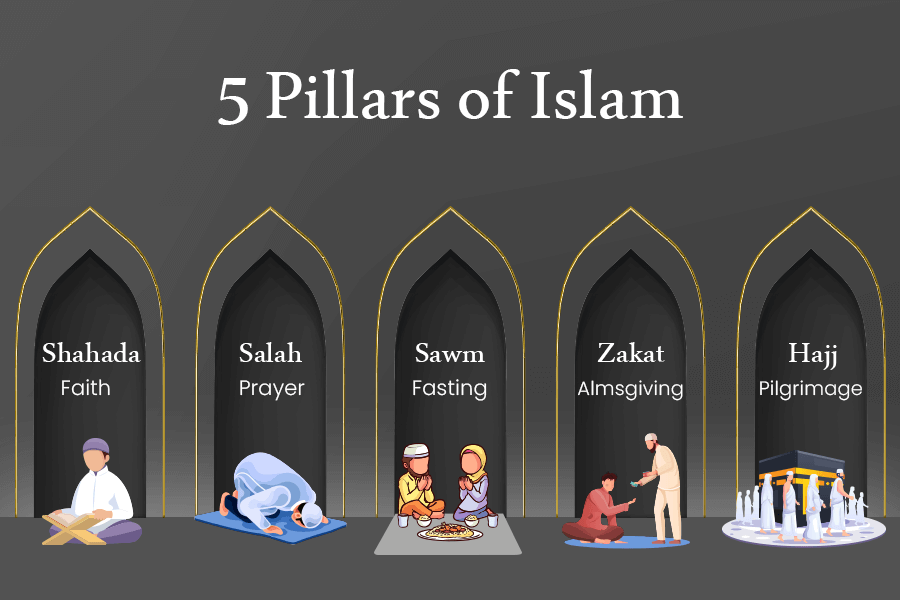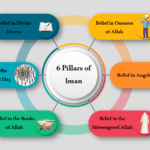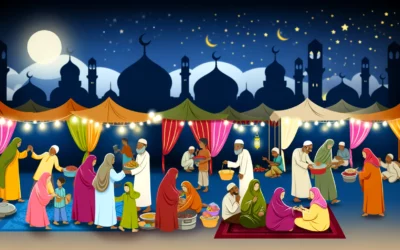Every Religion has its foundation, and Islam is based on the 5 pillars of Islam, which every Muslim must follow to establish a strong relationship with Allah Almighty.
What are the 5 pillars of Islam?
Islam has 5 pillars of faith that each Muslim must fulfil in their lifetime. The Prophet Muhammad (SAW) said,
بُنِيَ الإِسْلاَمُ عَلَى خَمْسٍ شَهَادَةِ أَنْ لاَ إِلَهَ إِلاَّ اللَّهُ وَأَنَّ مُحَمَّدًا رَسُولُ اللَّهِ، وَإِقَامِ الصَّلاَةِ، وَإِيتَاءِ الزَّكَاةِ، وَالْحَجِّ، وَصَوْمِ رَمَضَانَ
Allah’s Messenger (ﷺ) said: Islam is based on 5 pillars of Islam:
1. To testify that none has the right to be worshipped but Allah and Muhammad is Allah’s Messenger (ﷺ).
2. To offer the (compulsory congregational) prayers dutifully and perfectly.
3. To pay Zakat (i.e. obligatory charity).
4. To perform Hajj. (i.e. Pilgrimage to Mecca)
5. To observe fast during the month of Ramadan.
What is the name of the 5 pillars of Islam?
Islam is based on the 5 pillars of Islam. these are the following
First Pillar- Shahadah
The first pillar of Islam among the 5 pillars of Islam is Shahadah which means that Muslims bear witness to the oneness of God by reciting the creed
شَهَادَةِ أَنْ لاَ إِلَهَ إِلاَّ اللَّهُ وَأَنَّ مُحَمَّدًا رَسُولُ اللَّهِ
“There is no God but Allah, and Muhammad is the Messenger of Allah.”
The shahadah expresses a Muslim’s complete acceptance and total commitment to Islam. It distinguishes Muslims from those of other faiths.
Second Pillar- Salah
Salah is the second pillar of Islam from the 5 pillars of Islam. It is performed five times a day by all Muslims.
It is the act of worship, like the remembrance of Allah Almighty, the recitation of the Quran, and standing humbly before Allah.
Almighty, bowing, prostration, and requesting to Allah and Takbeer (saying the words “Allah o Akbar”).
Allah says:
وَمَآ أُمِرُوٓا۟ إِلَّا لِيَعْبُدُوا۟ ٱللَّهَ مُخْلِصِينَ لَهُ ٱلدِّينَ حُنَفَآءَ وَيُقِيمُوا۟ ٱلصَّلَوٰةَ وَيُؤْتُوا۟ ٱلزَّكَوٰةَ ۚ وَذَٰلِكَ دِينُ ٱلْقَيِّمَةِ
“And they were not commanded except to worship Allah, [being] sincere to Him in religion, inclining to truth, and establishing prayer and giving Zakah. And that is the correct religion.” [Quran 98: 5]
The most important pillar of Islam among the 5 pillars after the Shahadah. One might wonder why Muslims have to perform salah five-time every day. The timing of these prayers is set throughout the day so that one is constantly reminded of Allah and given opportunities to seek His guidance and forgiveness. Muslims perform salaah at the following times.
Fajr Salah: The Muslims start their day with the remembrance of Allah. It is performed before sunrise.
Salah of Dhohar: After the day’s work has begun, one breaks shortly after noon to again remember Allah and seek His guidance.
Asar Salah: Muslims perform this salah in the late afternoon. Muslims start their evening activities with this salaat.
Maghrib Salah: Just after the sun goes down, Muslims remember Allah again as the day ends and night is approaching.
Salah of Isha: Before going to sleep, Muslims perform this salaat to acquire His guidance, mercy, and forgiveness.
Third Pillar of Islam- Zakat
Zakat is the third pillar from the 5 Pillars of Islam . It means to purify one’s possession of wealth by distributing a prescribed amount to the poor as a fundamental Ibaadat.
What does Quran say about Zakat?
Wherever salaat is mentioned, the order for Zakat is there almost every time. Zakat was made compulsory at Makkah at the same time as Salaat; the Surahs of the Qur’an can verify this information. Zakat is mentioned seventy times in the Quran.
وَأَقِيمُوا۟ ٱلصَّلَوٰةَ وَءَاتُوا۟ ٱلزَّكَوٰةَ ۚ وَمَا تُقَدِّمُوا۟ لِأَنفُسِكُم مِّنْ خَيْرٍ تَجِدُوهُ عِندَ ٱللَّهِ ۗ إِنَّ ٱللَّهَ بِمَا تَعْمَلُونَ بَصِيرٌ
And establish prayer and give zakat, and whatever good you put forward for yourselves – you will find it with Allah. Indeed Allah, what you do, is See. (AL Quran 2:110)
Allah says in the Quran:
مَّثَلُ ٱلَّذِينَ يُنفِقُونَ أَمْوَٰلَهُمْ فِى سَبِيلِ ٱللَّهِ كَمَثَلِ حَبَّةٍ أَنۢبَتَتْ سَبْعَ سَنَابِلَ فِى كُلِّ سُنۢبُلَةٍ مِّا۟ئَةُ حَبَّةٍ ۗ وَٱللَّهُ يُضَٰعِفُ لِمَن يَشَآءُ ۗ وَٱللَّهُ وَٰسِعٌ عَلِيمٌ
The parable of those who spend their wealth in the way of Allah is that of a grain of corn. It grows seven ears, and each ear has a hundred grains. So Allah increases manifold to whom He pleases. (AlQuran 2:261).
The laws of Zakat are mentioned in the Quran. And The amount, distribution, and other details were defined at Madinah in the second year of Hijri. In the Quran, it is mentioned who is eligible for the Zakat.
إِنَّمَا ٱلصَّدَقَٰتُ لِلْفُقَرَآءِ وَٱلْمَسَٰكِينِ وَٱلْعَٰمِلِينَ عَلَيْهَا وَٱلْمُؤَلَّفَةِ قُلُوبُهُمْ وَفِى ٱلرِّقَابِ وَٱلْغَٰرِمِينَ وَفِى سَبِيلِ ٱللَّهِ وَٱبْنِ ٱلسَّبِيلِ ۖ فَرِيضَةً مِّنَ ٱللَّهِ ۗ وَٱللَّهُ عَلِيمٌ حَكِيمٌ
Zakah expenditures are only for the poor and for the needy and for those employed to collect [zakat] and for bringing hearts together [for Islam] and for freeing captives [or enslaved people] and for those in debt and the cause of Allah and the [stranded] traveller – an obligation [imposed] by Allah. And Allah is Knowing and Wise. (Al Quran 9:60)
Fourth Pillar of Islam- Sawm
Sawm means fasting during the holy month of Ramadan, the fourth pillar of Islam among the 5 pillars of Islam. Fasting is an obligatory act during the month of Ramadan.
The importance of Sawm is mentioned in the Quran,
يَٰٓأَيُّهَا ٱلَّذِينَ ءَامَنُوا۟ كُتِبَ عَلَيْكُمُ ٱلصِّيَامُ كَمَا كُتِبَ عَلَى ٱلَّذِينَ مِن قَبْلِكُمْ لَعَلَّكُمْ تَتَّقُونَ
O you who have believed, decreed upon you is fasting as it was prescribed for those before you that you may become righteous (AlQuran 2:183)
Fasting is also a practice of self-control whereby if someone is fasting with faith and for the sake of Allah Almighty, his sins will be forgiven.
The Prophet Muhammad (SAW) said,
من صام رمضان إيمانًا واحتسابًا، غفر له ما تقدم من ذنبه
“He who observes fasting during the month of Ramadan with Faith while seeking its reward from Allah will have his past sins forgiven.”
Fifth Pillar of Islam- Hajj
Hajj, the pilgrimage to Makkah, is the fifth pillar and the last pillar from the 5 pillars of Islam is mandatory for all physically and financially stable Muslims. It is the most remarkable spiritual gathering of Muslims worldwide to the Holy city.
قَالَ سُئِلَ النَّبِيُّ صلى الله عليه وسلم أَىُّ الأَعْمَالِ أَفْضَلُ قَالَ ” إِيمَانٌ بِاللَّهِ وَرَسُولِهِ ”. قِيلَ ثُمَّ مَاذَا قَالَ ” جِهَادٌ فِي سَبِيلِ اللَّهِ ”. قِيلَ ثُمَّ مَاذَا قَالَ ” حَجٌّ مَبْرُورٌ ”.
The Prophet (ﷺ) was asked, “Which is the best deed?” He said, “To believe in Allah and His Apostle.” He was then asked, “Which is the next (in goodness)?” He said, “To participate in Jihad in Allah’s Cause.” He was then asked, “Which is the next?” He said, “To perform Hajj-Mabrur. “
In performing the Hajj, a pilgrim follows the order of ritual that the Prophet Muhammad performed during his last pilgrimage.
Prophet Muhammad (SAW) told about the importance of Hajj as it is narrated inthe Hadith,
“ مَنْ حَجَّ لِلَّهِ فَلَمْ يَرْفُثْ وَلَمْ يَفْسُقْ رَجَعَ كَيَوْمِ وَلَدَتْهُ أُمُّهُ.
“Whoever performs Hajj for Allah’s pleasure and does not have sexual relations with his wife, and does not do evil or sins then he will return (after Hajj free from all sins) as if he were born anew.”
Why are the 5 pillars of Islam important?
The 5 pillars of Islam define the essential identity of Muslims, their faith, beliefs and practices and bind together a worldwide community of believers into a fellowship of shared values and concerns. The 5 pillars of Islam are considered the essential acts of worship that develop the Muslim character and strengthen Islam. It makes us surrender entirely to Allah’s will and become His faithful servants.
The 5 pillars of Islam remind Muslims of their life’s purpose and raised brotherhood, equality and humanity.
- Shahadah teaches us the purpose of life to worship Allah Almighty alone and to follow the path of Prophet Muhammad (SAW).
- Salah enriched the soul by giving peace and acquiring spiritual awareness.
- Zakat teaches us to give what Allah Almighty has granted us. It reminds blessings of Allah and encourages being grateful to Allah Almighty.
- Sawm purifies the soul and helps to acquire obeying Allah Almighty by restraining desires and promoting steadfastness.
- Hajj is a Muslim’s cultural journey that emphasizes the Islamic characteristics of unity and equality among Muslims.

















